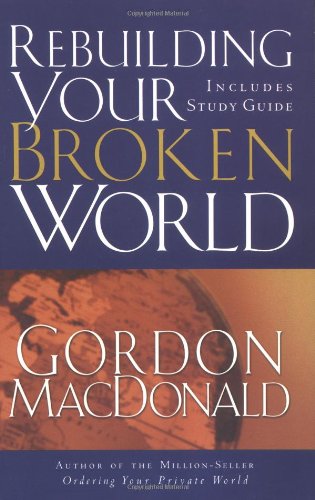This is a good piece from Darryl Dash. I found this very relevant this week. in light of the story that broke this week about another Christian leader (one of my heroes) caught in an adultery scandal.
Back in the day, I was a big fan of Gordon MacDonald, author of Ordering Your Private World. I still remember the day that I heard that he had resigned due to a moral failure. I think I believed that only the bad guys did that sort of thing. It was the first time that I truly realized the good guys are susceptible too.
Sadly, it’s not unusual to hear heartbreaking stories of moral failure. MacDonald’s book Rebuilding Your Broken World, written years after his moral failure, helped shape my understanding around this issue.
The whole book is worth reading, but it may be useful to summarize some of the important lessons I learned. Here are some that stick out to me:
Broken worlds are common. “The Bible abounds with examples of men and women whose worlds crashed from self-inflicted causes, and their responses range within great extremes,” writes MacDonald. We shouldn't be surprised.
 We’re all vulnerable. We need to confront three lies that we tell ourselves: Broken worlds are the exception, not the rule; a broken-world experience can never happen to me; and if my world breaks, then I can handle the results. We are all vulnerable, and the potential damage is greater than we can imagine.
We’re all vulnerable. We need to confront three lies that we tell ourselves: Broken worlds are the exception, not the rule; a broken-world experience can never happen to me; and if my world breaks, then I can handle the results. We are all vulnerable, and the potential damage is greater than we can imagine.
We’re especially vulnerable when we think we aren’t. A German teenager landed an airplane in Red Square because the Soviets hadn’t prepared for the threat of a small plane. When we leave our hearts unguarded, we’re in severe danger.
We are especially vulnerable in the areas of our strengths. “The Bible characters never fell on their weak points but on their strong ones; unguarded strength is double weakness,” writes Oswald Chambers.
Secrets lead to death; repentance and truth-telling leads to life.Cover-up and self-deception keeps us in bondage until we are ready to name the evil and move towards repentance and healing. Churches can help people move from secrecy to light.
Take preventative steps. Adopt a repentant lifestyle. Practice spiritual disciplines. Cultivate key relationships. Resist the applause that belongs to Christ. Take time to have fun. Hold things loosely. Be filled with the Spirit of God.
Restoration is possible. “Either you believe in the capacity of Christ’s atonement to make you a new person, or you don’t. If you do, then start living like a forgiven person should live. And how is that done? By being a lot more quiet, humble, thankful, sensitive, and anxious to serve than you ever were before. Forgiven people basically live like that,” MacDonald says.
Restoration follows a process. For starters: be silent and withdraw; refuse to defend yourself; assume the ministry of the interior; walk through the pain rather than avoiding it.
Restoration requires others. “Ultimately, rebuilding broken worlds can never happen alone. It is a team effort, and it has to be accomplished in concert with those who can give grace and affirm progress,” says MacDonald. “The grace that helps to rebuild a broken world is something given: never deserved, never demanded, never self-induced.”
The lessons from this book have stuck with me for years. I've appreciated rereading them again this week. I pray we'll learn them well as those who walk with others who fail, and face the danger (or reality) of our own sins and failures.
We’re all vulnerable. We need to confront three lies that we tell ourselves: Broken worlds are the exception, not the rule; a broken-world experience can never happen to me; and if my world breaks, then I can handle the results. We are all vulnerable, and the potential damage is greater than we can imagine.
No comments:
Post a Comment